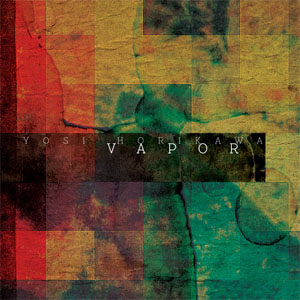Yosi Horikawa Vapor
Yosi Horikawa likes to take his time between releases, which seems fitting for an artist […]

Yosi Horikawa likes to take his time between releases, which seems fitting for an artist whose music is highly contemplative. Listening to his music, it’s easy to imagine Horikawa—who’s based in Chiba, Japan—ruminating over every painstaking detail on the 16 songs that comprise Vapor, his first LP and the fourth official release in his catalog. Tracks like “Kingdom of Frogs” are teeming with minutiae; croaking and chirping amphibians, humming bugs, trickling bubbles, delicately plucked keys, crisp claps, pulsing low end, and deep drums are all part of the mix. Somehow, Horikawa creates whole environments of sound that seem to be at once vibrantly alive and digitally artificial.
Field recordings are a key component of Horikawa’s work, and he often sculpts their many sonic elements into sturdy beats. For instance, on “Bump,” the sound of waves slapping creates the backbone of a lurching rhythm. “Wandering” finds the sound of birds tweeting intersecting with complex, jangling percussion, and on “Letter,” the scratches and tapping noises of a hand running a pencil across a page provide an infrastructure for hooting synth melodies and clattering drums. The various beats and song structures arise naturally and even though they’ve also been embellished with glittering synth melodies and wafts of pads and other audio effects, they evoke strong images—a boat being rowed through lapping waves, a highly animated forest, a concentrated scribe fervently composing a message.
Horikawa’s ability to conjure potent imagery with his productions lends a cinematic quality to the songs, which in turn acts as a common thread between the 16 tracks. Vapor travels through a host of different genres: “Wandering” brings to mind the more adventurous end of UK dubstep, namely the rattling beats of Untold’s rework of Ramadanman’s “Revenue,” while “Bump” toys with rocking trip-hop formats. Bubbling noises and pattering rainfall evolve into jittery footwork rhythms on “Splash” and “Starlings,” and on “Stars,” Horikawa ventures into downtempo jazz with galloping notes from an upright bass and melancholy piano chords. But regardless of what sounds Horikawa is mining, these explorations remain aesthetically linked by his highly visual, dramatic proclivities.
Vapor demonstrates not only Horikawa’s versatility as an artist, but also his ability to retain a unique voice and compelling perspective no matter what form his music takes. It’s a long album—one might be tempted to take a break around the halfway mark—but each track contains an intricate ecosystem of noises to marvel at.

